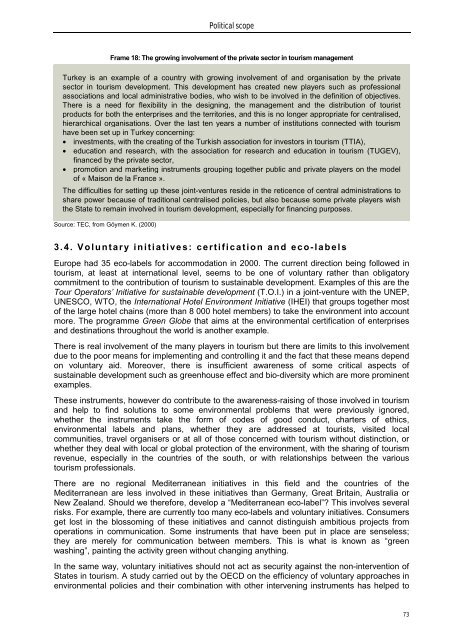dossier sur le tourisme et le développement durable
dossier sur le tourisme et le développement durable
dossier sur le tourisme et le développement durable
You also want an ePaper? Increase the reach of your titles
YUMPU automatically turns print PDFs into web optimized ePapers that Google loves.
Political scope<br />
Frame 18: The growing involvement of the private sector in tourism management<br />
Turkey is an examp<strong>le</strong> of a country with growing involvement of and organisation by the private<br />
sector in tourism development. This development has created new players such as professional<br />
associations and local administrative bodies, who wish to be involved in the definition of objectives.<br />
There is a need for f<strong>le</strong>xibility in the designing, the management and the distribution of tourist<br />
products for both the enterprises and the territories, and this is no longer appropriate for centralised,<br />
hierarchical organisations. Over the last ten years a number of institutions connected with tourism<br />
have been s<strong>et</strong> up in Turkey concerning:<br />
• investments, with the creating of the Turkish association for investors in tourism (TTIA),<br />
• education and research, with the association for research and education in tourism (TUGEV),<br />
financed by the private sector,<br />
• promotion and mark<strong>et</strong>ing instruments grouping tog<strong>et</strong>her public and private players on the model<br />
of « Maison de la France ».<br />
The difficulties for s<strong>et</strong>ting up these joint-ventures reside in the r<strong>et</strong>icence of central administrations to<br />
share power because of traditional centralised policies, but also because some private players wish<br />
the State to remain involved in tourism development, especially for financing purposes.<br />
Source: TEC, from Göymen K. (2000)<br />
3.4. Voluntary initiatives: certification and eco-labels<br />
Europe had 35 eco-labels for accommodation in 2000. The current direction being followed in<br />
tourism, at <strong>le</strong>ast at international <strong>le</strong>vel, seems to be one of voluntary rather than obligatory<br />
commitment to the contribution of tourism to sustainab<strong>le</strong> development. Examp<strong>le</strong>s of this are the<br />
Tour Operators’ Initiative for sustainab<strong>le</strong> development (T.O.I.) in a joint-venture with the UNEP,<br />
UNESCO, WTO, the International Hotel Environment Initiative (IHEI) that groups tog<strong>et</strong>her most<br />
of the large hotel chains (more than 8 000 hotel members) to take the environment into account<br />
more. The programme Green Globe that aims at the environmental certification of enterprises<br />
and destinations throughout the world is another examp<strong>le</strong>.<br />
There is real involvement of the many players in tourism but there are limits to this involvement<br />
due to the poor means for imp<strong>le</strong>menting and controlling it and the fact that these means depend<br />
on voluntary aid. Moreover, there is insufficient awareness of some critical aspects of<br />
sustainab<strong>le</strong> development such as greenhouse effect and bio-diversity which are more prominent<br />
examp<strong>le</strong>s.<br />
These instruments, however do contribute to the awareness-raising of those involved in tourism<br />
and help to find solutions to some environmental prob<strong>le</strong>ms that were previously ignored,<br />
wh<strong>et</strong>her the instruments take the form of codes of good conduct, charters of <strong>et</strong>hics,<br />
environmental labels and plans, wh<strong>et</strong>her they are addressed at tourists, visited local<br />
communities, travel organisers or at all of those concerned with tourism without distinction, or<br />
wh<strong>et</strong>her they deal with local or global protection of the environment, with the sharing of tourism<br />
revenue, especially in the countries of the south, or with relationships b<strong>et</strong>ween the various<br />
tourism professionals.<br />
There are no regional Mediterranean initiatives in this field and the countries of the<br />
Mediterranean are <strong>le</strong>ss involved in these initiatives than Germany, Great Britain, Australia or<br />
New Zealand. Should we therefore, develop a “Mediterranean eco-label”? This involves several<br />
risks. For examp<strong>le</strong>, there are currently too many eco-labels and voluntary initiatives. Consumers<br />
g<strong>et</strong> lost in the blossoming of these initiatives and cannot distinguish ambitious projects from<br />
operations in communication. Some instruments that have been put in place are sense<strong>le</strong>ss;<br />
they are merely for communication b<strong>et</strong>ween members. This is what is known as “green<br />
washing”, painting the activity green without changing anything.<br />
In the same way, voluntary initiatives should not act as security against the non-intervention of<br />
States in tourism. A study carried out by the OECD on the efficiency of voluntary approaches in<br />
environmental policies and their combination with other intervening instruments has helped to<br />
73
















